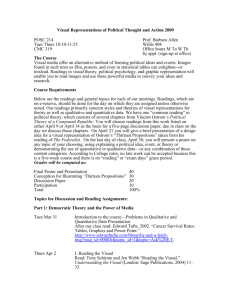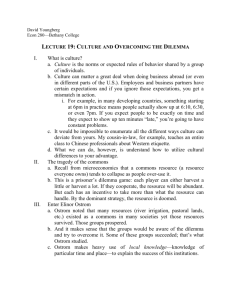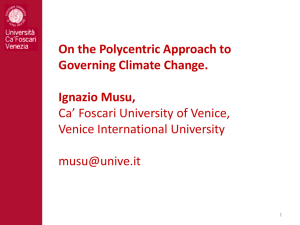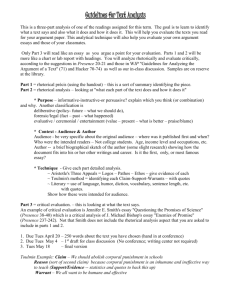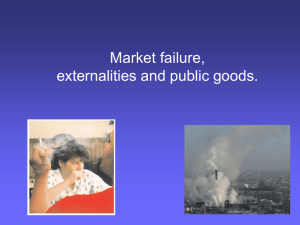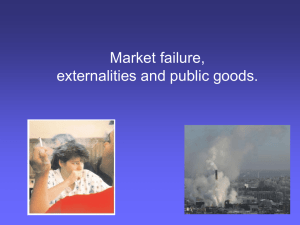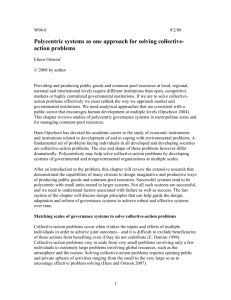Winter
advertisement
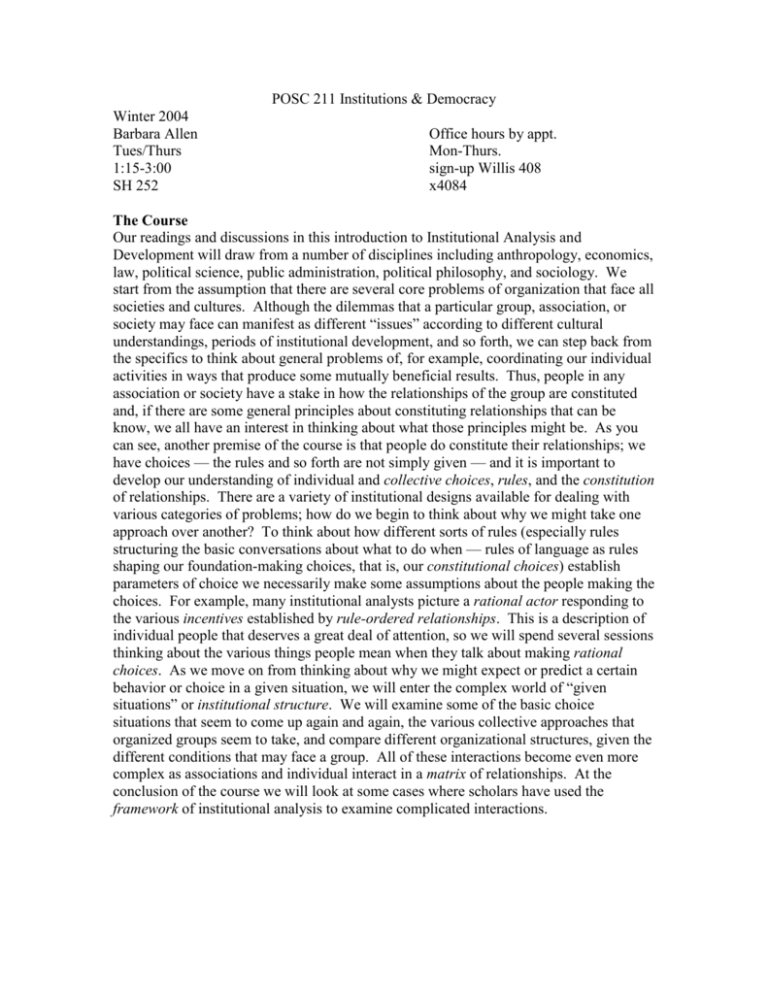
POSC 211 Institutions & Democracy Winter 2004 Barbara Allen Tues/Thurs 1:15-3:00 SH 252 Office hours by appt. Mon-Thurs. sign-up Willis 408 x4084 The Course Our readings and discussions in this introduction to Institutional Analysis and Development will draw from a number of disciplines including anthropology, economics, law, political science, public administration, political philosophy, and sociology. We start from the assumption that there are several core problems of organization that face all societies and cultures. Although the dilemmas that a particular group, association, or society may face can manifest as different “issues” according to different cultural understandings, periods of institutional development, and so forth, we can step back from the specifics to think about general problems of, for example, coordinating our individual activities in ways that produce some mutually beneficial results. Thus, people in any association or society have a stake in how the relationships of the group are constituted and, if there are some general principles about constituting relationships that can be know, we all have an interest in thinking about what those principles might be. As you can see, another premise of the course is that people do constitute their relationships; we have choices — the rules and so forth are not simply given — and it is important to develop our understanding of individual and collective choices, rules, and the constitution of relationships. There are a variety of institutional designs available for dealing with various categories of problems; how do we begin to think about why we might take one approach over another? To think about how different sorts of rules (especially rules structuring the basic conversations about what to do when — rules of language as rules shaping our foundation-making choices, that is, our constitutional choices) establish parameters of choice we necessarily make some assumptions about the people making the choices. For example, many institutional analysts picture a rational actor responding to the various incentives established by rule-ordered relationships. This is a description of individual people that deserves a great deal of attention, so we will spend several sessions thinking about the various things people mean when they talk about making rational choices. As we move on from thinking about why we might expect or predict a certain behavior or choice in a given situation, we will enter the complex world of “given situations” or institutional structure. We will examine some of the basic choice situations that seem to come up again and again, the various collective approaches that organized groups seem to take, and compare different organizational structures, given the different conditions that may face a group. All of these interactions become even more complex as associations and individual interact in a matrix of relationships. At the conclusion of the course we will look at some cases where scholars have used the framework of institutional analysis to examine complicated interactions. Readings The readings for the course have been drawn from a number of books and journal articles available on reserve at the library. You may make copies for your personal use. Assignments In addition to coming to class prepared to discuss the readings and topics listed for each meeting below, you will write two essays discussing a particular issue raised by each main sections of our readings. The first essay will cover topics from the first two parts of the course — the construction of the “rational actor” and various ways of understanding the problems that result when the individual actions of rational actors sum to unintended and undesirable results. The second essay will cover the third and fourth parts to the course. In part three we see that dealing with “the individual” is just the beginning — we also have to deal with the various “authority” or rule enforcers that we constitute to address the problems examined in parts one and two. Institutional analysis offers an approach to constitutional design that will highlight the strengths and weakness of four major categories of rule ordered relations: markets, centralized authority (hierarchies), decentralized authority (including center-periphery designs), and polycentric designs (including federalism). For four of our sessions, I offer you the choice of reading in greater depth about a specific institutional form (centralization, decentralization, and polycentricity) and the moral implications of institutional development, as compared to other measures of institutional performance such as efficiency, effectiveness, sustainability, etc. Each of you will do the depth reading for one of these four options (we’ll make assignments according to your interests in class). One of the choices for your final essay will be to tackle the “depth” reading assignments for additional topics, so that you can write a comparative essay about institutional designs or evaluate one of our case studies (part four) from some angle that examines (critiques, augments, whatever) the analysis given by our authors. Grades will be computed as follows: Essay 1 Essay 2 Participation Total 40 40 20 100% Part 1: Cause, Order, and Pattern: Ideas about Nature and Culture and Implications for Institutional Design and Development Tues Jan 6 The Study of Institutions—two (related?) perspectives Read: John Searle, ed. 1969. “The Distinction Between Brute Facts and Institutional Facts.” In Speech Acts: An Essay on the Philosophy of Language. New York: Cambridge University Press. 50-53. Thomas Hobbes. 1994 [1651]. Leviathan. Edwin Curley, ed. Indianapolis: Hackett Publishing. “Author’s Introduction” 3-5. Thurs Jan 8 Common sense as ordering principle Read: Clifford Geertz. 1983. “Common Sense as a Cultural System,” in Local Knowledge. New York: Basic Books. 73-93. Tues Jan 13 Knowledge as Pattern: Implications for Design Read: Herbert Simon. 1982. “Designing Organizations for an Information Rich World.” In Models of Bounded Rationality. Vol 2. Cambridge: MIT Press. 171-185. Vincent Ostrom. 1997. “Back to Basics” and “The Human Condition: Life, Learning, Language, Knowledge, Culture, and the Problem of Order,” in The Meaning of Democracy and the Vulnerabilities of Democracy. Michigan: Michigan University Press. 117-150. F.A. Hayek. 1945. “The Use of Knowledge in Society,” American Economic Review. 35: 4, 519-530. Part 2: The Idea of “Rationality” and Reasonable Expectations of Rational Actors Collective Action and Assurance Problems, Uncertainties and Asymmetries of Information and other Resources Thurs Jan 15 Tues Jan 20 Thurs Jan 22 Rational Choices, Non-exclusion, and the “free rider” Read: Garrett Hardin. 1968. “The Tragedy of the Commons,” Science 162 (December 13). 1243-1248. Kenneth Boulding. 1963. “Towards a Pure Theory of Threat Systems,” American Economic Review (May) 424534. Mancur Olson. 1971. “Introduction,” “A Theory of Groups and Organizations,” and Group Size and Group Behavior,” from The Logic of Collective Action. Cambridge: Harvard University Press. 1-66. Leaving the “State of Nature” is just the beginning: Imperfect Information and “Bounded Rationality” Read: Herbert Simon. 1947. Administrative Behavior. Chapters 4 &5. New York: Macmillan. Herbert Simon. 1986. “Rationality in Psychology and Economics,” Journal of Business. 59:4 pt. 2 S209-S224. Karl Popper. 1985. “The Rationality Principle (1967),” in Popper Selections, ed. David Miller. Princeton: Princeton University Press. 357-365. More on Uncertainty and Rationality Read: Amos Tversky and Daniel Kuhneman. 1986. “Rational Choice and the Framing of Decisions,” Journal of Business 59: 4 pt 2. S251-S278. Amartya Sen. 1977. “Rational Fools: A Critique of the Behavioral Foundations of Economic Theory,” Philosophy and Public Affairs. 6: 4 (summer) 317-344. Kenneth Arrow. 1974. “Rationality: Individual and Social” and “Organization and Information” in The Limits of Organization. New York: WW Norton. 15-43. Herbert Simon. “From Substantive to Procedural Rationality” in Models of Bounded Rationality. 424-443. Tues Jan 27 More Problems with our Models of Exchange: Contractual Uncertainties, “Friction,” Transaction Costs, and increasingly complex, yet rational interactions Read: Oliver Williamson. 1986. “The Vertical Integration of Production: Market Failure Considerations” (pp. 85-100) and “What is Transaction Cost Economics?” from Economic Organization. New York: New York University Press. 174-191. Douglass North. 1990. “A Transaction Cost Theory of Politics,” Journal of Theoretical Politics. 2(4): 355-367. John R. Commons. 1968. “Transactions,” The Legal Foundations of Capitalism Madison: University of Wisconsin Press. 65-69. Oliver Williamson. 2000. “Economic Institutions and Development: A View from the Bottom,” in Mancur Olson, ed. Not so Dismal Science. Oxford: Oxford University Press. 92-118. **********************Topics for Essay 1 Discussed*********************** Thurs Jan 29 Networks, Goodwill, and Information Asymmetries Read: Margaret Archer. 1995. “The Vexatious fact of Society,” from Realist Social Theory: The Morphogenic Approach. Cambridge: Cambridge University Press. 1-30. C. Ford Runge. 1984. “Institutions and the Free Rider: The Assurance Problem in Collective Action,” Journal of Politics. 46 155-181. OR READ Thomas Schelling. 1978. “Thermostats, Lemons, and Other Families of Models” Micro Motives and Macro Behavior. New York: WW Norton. 83-133. Elinor Ostrom. 1990. Governing the Commons. London: Cambridge University Press. Ch 1. “Reflections on the Commons,” London: Cambridge University Press. 1-28. Tues Feb 3 Summary: Micro-motivation and aggregate actions: Implications for Institutional Development Read: Mary Parker Follett. 1940. “Constructive Conflict,” in H.C. Metcalf and L. Urwick, eds. Dynamic Administration. New York: Harper & Row 30-49. Jonathan Bendor and Dilip Mookherjee. 1987. “Institutional Structure and the Logic of Ongoing Collective Action,” American Political Science Review. 81: 1 (March) 129-151. Part 3: The Institutional Basis for Constructive Conflict and Cooperation Thurs Feb 5 Individual Choice is only one issue: Rent seeking and tyranny of other sorts Read: John R. Commons “The Price Bargain” in Legal Foundations of Capitalism, 225-282. Elinor Ostrom. Governing the Commons Chapter 2, “An Institutional Approach to the Study of Self-Organization and Self-Governance in CPR Situations.” 29-57. Vincent Ostrom. 1999. “Cryptoimperialism, Predatory States, and Self-Governance,” in Michael McGinnis, ed. Polycentric Governance and Development. Ann Arbor: University of Michigan Press. Barry Weingast. 1995. “The Economic Role of Political Institutions: Market Preserving Federalism and Economic Development,” Journal of Economics and Organizations 11: (April) 1-31. Douglass North and Barry Weingast. 1996. “The Evolution of Modern Institutions of Growth,” in Lee J. Alston, et al. eds. Empirical Studies in Institutional Change. London: Cambridge University Press. 134-165. ***************************Essay 1 Due in Class************************** Tues Feb 10 The Problems of Scale and Scope in Institutional Design Read: Oran Young. 1995. “The Problem of Scale in Human/Environment Relationships,” in Local Commons and Global Interdependence. Robert Keohane and Elinor Ostrom, eds. London: Sage. 27-45. Duncan Snidal. 1995. “The Politics of Scope: Endogenous Actors, Heterogeneity and Institutions,” in Local Commons and Global Interdependence. 47-70. Michael McGinnis. 1996. “Multiple Agents in Overlapping Realms of Collective Action: A Reformulation of International Relations Theory. Unpublished manuscript Avner Greif. 1995. “Institutional Structure and Economic Development.” Unpublished manuscript. Thurs Feb 12 A Framework for Institutional Analysis Read: Elinor Ostrom, et al. 1994. Rules, Games, and Common-Pool Resources. Ann Arbor: University of Michigan Press Ch. 1 & 2, 3-21;23-50 Elinor Ostrom, et al. 1993. Institutional Incentives and Sustainable Development. San Francisco: Westview Press. Ch 5 & 6. ********Assignment of Depth Reading; Discussion of Topics for Second Essay ****** Tues Feb 17 Analyzing Centralized Institutional Arrangements Read: E. Ostrom, Institutional Incentives Ch 7 For more depth read: Hobbes Leviathan. Ch 3-7; 10, 11; 13-16; 17-19 Thurs Feb 19 Analyzing Decentralized Institutional Arrangements Read: E. Ostrom, Institutional Incentives Ch 8 For more depth read: Max Weber. 1977 [c 1914-1920] Economy and Society. Guenther Roth and Claus Wittich eds. Berkeley: University of California Press. “The Types of Legitimate Domination,” V 1 pt 1, Ch 3 212-254; “Household, Neighborhood and Kin Group,” V1 pt. 2 356369; “Domination & Legitimacy” V2. Ch 10, 941-953. “Bureaucracy” V2 Ch 11, 956-1005. Robert Michels. 1959. Political Parties. New York: Dover Publications, Part Six “Synthesis: the Oligarchic Tendencies of Organizations” 365-408. Tues Feb 24 Analyzing Polycentric Institutional Arrangements Read: E. Ostrom, Institutional Incentives Ch 9 For more depth read: Alexander Hamilton, John Jay, James Madison. 1789. Federalist New York: Modern Library. Numbers 1, 10, 15, 23, 47, 51, (3-7; 53-63;86-95; 141-147; 312-321; 335-341) Alexis de Tocqueville. 2000 [1835-41]. Democracy in America. Harvey Mansfield and Delba Winthrop trans. V. 1 pt. 1 Ch 2-5; pt. 2 Ch. 1, 5-9. V. Ostrom. 1995. “A Forgotten Tradition: The Constitutional Level of Analysis” in Polycentric Governance and Development. 151-165. Daniel Elazar. 1974. “First Principles,” in The Federal Polity, Daniel Elazar, ed. New Brunswick: Transaction Books. 1-10. Thurs Feb 26 Moral Philosophy and Institutional Design Read: Philip Selznick. 1992. The Moral Commonwealth. Berkeley: University of California Press. Part 3, “Moral Institutions” (229-354) Ch. 16, “Covenant & Commonwealth” (477-538) More on the subject read: V. Ostrom “The Ontological Foundations of Human Understanding” and “ArtisanshipArtifact Relationships” in The Meaning of Democracy, 175-226. Part 4: Cases Studies in Institutional Analysis and Development Tues Mar 2 Institutional Development and Natural Resource Management— Possibilities in Self-Government Read: Vincent Ostrom. 1999. “Legal and Political Conditions of Water Resource Development” in McGinnis, Polycentric Governance and Development. 42-59 Elinor Ostrom. 1999. “Design Principles in Long-Enduring Irrigation Institutions.” in McGinnis, Polycentric Governance and Development. 74-86. Thurs Mar 4 1. An institutional approach to regulated monopoly Read: Oliver Williamson “Franchise Bidding for Natural Monopolies— in General and with Respect to CATV,” Economic Organization, 258-297. 2. An institutional analysis of Centralization and Sovereignty Read: Kathryn Firmin-Sellers. 1999. “The Concentration of Authority: Constitutional Creation in the Gold Coast, 1950,” in McGinnis, Polycentric Governance and Development. 186-208. Tues Mar 9 The Uses of Institutional Analysis— Our Summation *******************Essay Two Due in Class*******************


